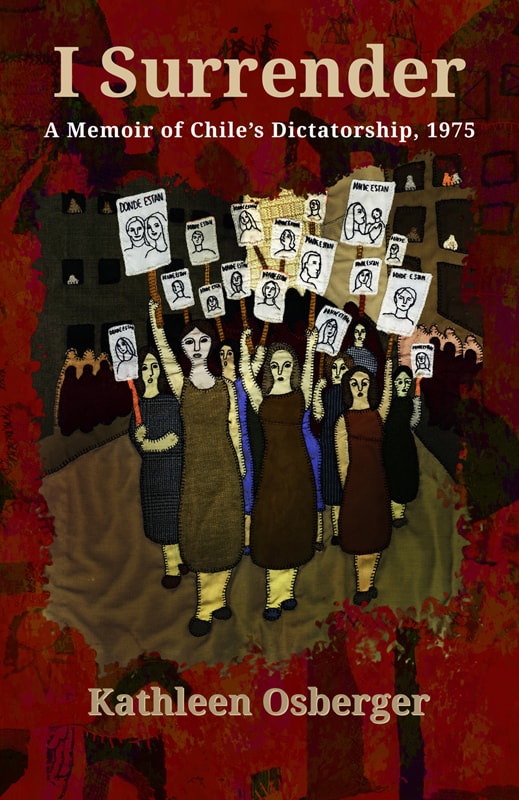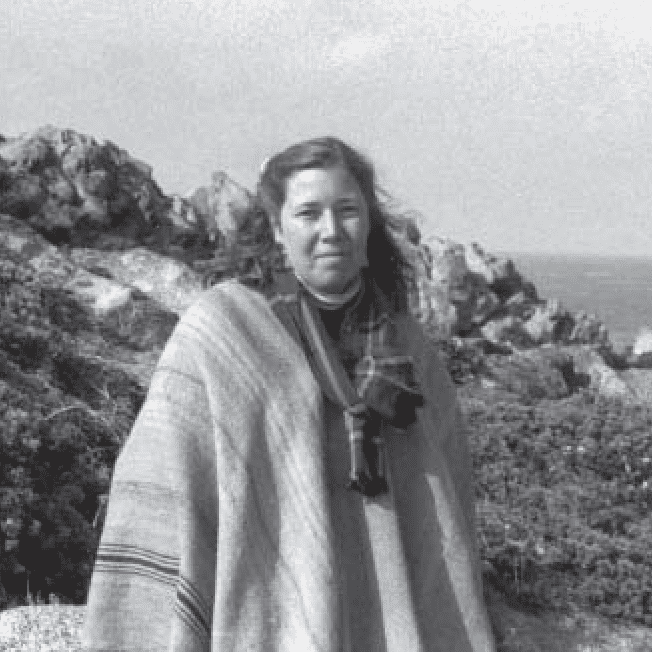As a lay volunteer, book author was witness to the faith and courage of sisters, priests and lay people who helped victims of the dictatorship.
As the anniversary of 9/11 approaches, Orbis Books, the publishing company of the Maryknoll Fathers and Brothers, commemorates another fateful and tragic event.
“In the United States we remember 9/11, September 11, as a particularly important date, but in Latin America it has for a long time carried a very different meaning,” said Robert Ellsberg, Orbis Books publisher. On that date in 1973, Chile was plunged from a democracy into a dictatorship.
This year marks the 50th anniversary of the coup d’état that caused the death of elected President Salvador Allende and the rise to power of General Augusto Pinochet.
I Surrender: A Memoir of Chile’s Dictatorship, 1975 is a firsthand account by Kathleen M. Osberger of her experiences in Chile two years into the dictatorship — including her ordeal at the hands of Chile’s secret police.
As a recent graduate of the University of Notre Dame, Osberger signed on to a program run by the Congregation of Holy Cross priests in Chile and Peru. Placed with the School Sisters of Notre Dame in Chile’s capital city, Santiago, she was to teach in a Maryknoll elementary school.
In a recent podcast interview to promote the book, Osberger told Ellsberg, “The day I arrived, the sisters shared with me a big secret. They told me that they were hiding people who were in the crosshairs of the secret police, known as the DINA.
“I took a deep breath and I said, ‘I am here to learn, let me begin to understand the motivation that is drawing them to do this at tremendous risk to their own lives.’”
Osberger had previously lived in Spain under the Francisco Franco dictatorship and then in Panama under the Omar Torrijos dictatorship. However, she said in the One on One Orbis Books podcast, “I could not fathom what the repression in Chile was going to be like.”
Between 1973 and 1990, the Pinochet regime was responsible for thousands of politically motivated arrests, extrajudicial murders and torture of prisoners. A secret police force known as the Directorate of National Intelligence, DINA, terrorized the country.
The tactic of “disappearing” people was systematically carried out with particular brutality during the early years of military rule. Prisoners were held in secret and subjected to torture that included electric shocks, waterboarding, beatings and sexual abuse before they were “disappeared,” never to be seen again.
This was the context in which Osberger found herself — at 22 years old.
Underground movements had mobilized, but their members’ lives were at stake. Whether a dissenter was a militant or simply a political objector, Osberger said in the podcast interview, “Pinochet wanted to get every dissident. … He wanted them dead.”

I Surrender: A Memoir of Chile’s Dictatorship, 1975, is a firsthand account by Kathleen M. Osberger of her experiences in Chile during the dictatorship — including her ordeal at the hands of Chile’s secret police. (Photo courtesy of Orbis Books)
People being hunted by the DINA were sheltered by individuals and organizations that defended human rights. Notably, many of these efforts were organized by the ecumenical Comité de Cooperación para la Paz (Committee of Cooperation for Peace in Chile), known also as Comité Pro Paz. Its members included Methodist, Baptist, Lutheran and Orthodox churches, as well as Jewish leaders. The influential Archdiocese of Santiago, led by Cardinal Raúl Silva Henríquez, provided much-needed protection.
One of Osberger’s housemates worked at the Committee for Peace, and the religious women with whom Osberger lived and worked — the School Sisters of Notre Dame and the Maryknoll Sisters — agreed to protect people who were at risk of capture. In doing so, their own lives were endangered.
On October 15, 1975, a shootout took place in Malloco, a rural area near the capital, between the DINA and leaders of the Movimiento de Izquierda Revolucionaria, Movement of the Revolutionary Left (MIR). The MIR lookout was killed but four guerrillas escaped: MIR’s top leader and nephew of the deposed Salvador Allende, Andrés Pascal Allende; his partner Mary Ann Beausire; another MIR leader, Nelson Gutiérrez; and his partner Marie Elena Bachman. Gutiérrez and Bachman had their baby with them at the hideout. Gutiérrez was wounded during their escape.
“They were running in the field and [Gutiérrez] had two bullet wounds in his leg. They were carrying their 9 or 10-month-old baby in their arms,” Osberger said in the podcast interview.
A woman in the farm community offered to help the parents: “They gave her the baby,” Osberger said. Eventually the child would be brought to the well-known Vicariate of Solidarity that replaced the Committee for Peace when Pinochet brought about its dissolution at the end of 1975.
After hiding in the countryside for a couple days, Osberger narrates, the MIR fugitives “made a break for it, [but] they weren’t going to go far on foot.” They hijacked cars and abandoned them after driving them in different directions in an attempt to elude their pursuers.
Osberger recalls “a 24/7 manhunt” and constant threats by the regime on the radio and other media against anyone who helped the MIR fugitives.
On October 20, a birthday dinner was being held for Sister Helen Nelson at the School Sisters of Notre Dame convent. A young woman introduced to Osberger as “Mariana” had been brought to the house. “About 30 people were gathered,” Osberger said, “when into the midst of the gathering, Nelson Gutierrez and his spouse were brought in through the back door … to be hidden in the convent.”
The next day, the sisters moved Osberger and their other two young volunteers for their safety to the Maryknoll sisters’ house at the school where Osberger taught.
The conditions for sheltering dissidents were that no weapons would be allowed inside, nor would there be any outside communication. While the School Sisters of Notre Dame went out to work for the day, Maryknoll Sister Margaret Lipsio, with 10 years of mission experience in Chile, came to their convent to keep watch and to ensure that these conditions were respected.
The Committee for Peace had to figure out how to help the fugitives.
“A British doctor, Sheila Cassidy, was brought to the convent to try to treat [Gutiérrez’s] wounds. But they couldn’t be treated because sepsis was growing,” Osberger said in the podcast interview. “So they had to get him to an embassy to assemble a team to operate on him.”
She continued, “None of the embassies were willing to take in such a high profile enemy of the state, so to speak.” Finally, the Vatican embassy agreed to take him in. He was driven there in the trunk of the sisters’ car.
Beausire had already been transported to where Allende was hidden. They would be given refuge in the Costa Rican embassy and eventually leave Chile for Cuba. Gutiérrez would receive medical treatment and, after 10 months in the Vatican embassy, leave the country with Bachman for Cuba.
In the meantime, the hunt continued for the militants and those who had helped them.
First to be apprehended was Doctor Cassidy, who had treated Gutiérrez. She was taken into custody after DINA agents shot a barrage of gunfire at the Columban Fathers house. The housekeeper, an innocent bystander, was killed.
Osberger had left the Columban Fathers house just before the secret police arrived to detain Cassidy. She and the other two laywomen were again living at the School Sisters of Notre Dame convent.
On the morning of Nov. 2, Osberger reports, at around 4:30 or 5:00 in the morning, there was heavy pounding on the door. DINA agents entered, ransacking the house and demanding information about the MIR fugitives.
They asked who knew Sheila Cassidy.

Kathleen M. Osberger, author of I Surrender: A Memoir of Chile’s Dictatorship, 1975. (Photo courtesy of Orbis Books)
Osberger hoped to save the sisters and other laywomen from harm. “I said, ‘I do.’ So they took me prisoner.” But not before Sister Paula Armstrong — braving the wrath of the DINA agents with machine guns — prayed over her.
In the interview, Osberger described a U.S. commander who directed the agents. “When he was interrogating me, I was looking at his eyes and watching his demeanor, and most especially listening to his speech. And I was like, wait a minute. This guy is an American! He is from the Midwest! What is he doing here?” she said. “It was just a sickening feeling.”
From exhaustive research and interviews, including those she conducted in Chile in 2007, Osberger later pieced together the events of those turbulent weeks. She determined that the commander was indeed an American; his name was Michael Townley.
Osberger was given a blindfold to put on and driven away. “They never actually touched me physically, but they took me to the secret prison, Villa Grimaldi, where Dr. Sheila Cassidy was being tortured — severely, severely tortured.” The physician, who endured 59 days of imprisonment, was repeatedly administered electric shocks.
At the prison, Townley and the DINA agents pressured Osberger to incriminate others and to reveal the whereabouts of the fugitives. “Eventually the secret police took me around to the Maryknoll sisters center house [in Los Leones] … but Sister Katherine Gilfeather was very audacious in her response. They took me up to the front door. I threw off my blindfold. They were standing there with machine guns, Sunday morning at probably 7:30 or 8:00 a.m. She stood in the doorway and would not let them in despite their machine guns. And she pushed me inside,” Osberger said in the interview.
Not wanting the others present to be harmed, after a short time she went back outside where the DINA agents were waiting for her — not knowing what would happen next.
To readers’ relief as well as Osberger’s, “For some reason they just drove me back to my house, the convent where I was living.”
Osberger went on to earn master’s degrees from Maryknoll School of Theology and the University of Chicago School of Social Service Administration. She has worked in the South Bronx and Chicago. As a licensed clinical social worker and therapist, her work centers on issues of trauma and torture.
“I Surrender is more than one person’s story,” states Orbis Books’ press release about the book. “Osberger pays tribute to those risking their lives to take a stand against a murderous regime, particularly faithful Chileans and Catholic religious and clergy — including Holy Cross priests, School Sisters of Notre Dame, Maryknoll Sisters and Jesuits.”
The author also exposes the collusion of then-President Richard Nixon, Attorney General John Mitchell, Assistant for National Security Affairs Henry Kissinger and CIA Director Richard Helms in destabilizing Allende’s Chile in preparation for a military takeover. The United States continued supporting the Pinochet dictatorship until the plebiscite in 1988 that would finally displace him from power in 1990.
With the passing away of many protagonists from the story and the 50th anniversary of the coup approaching, Osberger said she felt compelled to compile both her personal memories and the information she had gathered over the decades.
“The church in Chile was steadfast against these human rights abuses,” Osberger said. “Even people who may be politically were reluctant to act, they were willing to act as Christians to save people’s lives.”
Featured image: A woman hammers crosses into the ground in London’s Parliament Square March 23, 1999. The crosses represent people who are believed to have been killed or kidnapped under the regime of former Chilean dictator Augusto Pinochet. (CNS photo from Reuters) (March 24, 1999)

